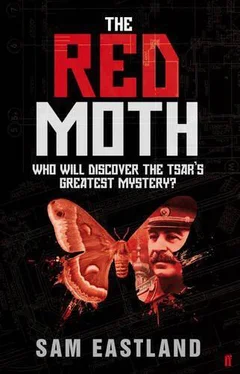Sam Eastland - Red Moth
Здесь есть возможность читать онлайн «Sam Eastland - Red Moth» весь текст электронной книги совершенно бесплатно (целиком полную версию без сокращений). В некоторых случаях можно слушать аудио, скачать через торрент в формате fb2 и присутствует краткое содержание. Жанр: Исторический детектив, на английском языке. Описание произведения, (предисловие) а так же отзывы посетителей доступны на портале библиотеки ЛибКат.
- Название:Red Moth
- Автор:
- Жанр:
- Год:неизвестен
- ISBN:нет данных
- Рейтинг книги:3 / 5. Голосов: 1
-
Избранное:Добавить в избранное
- Отзывы:
-
Ваша оценка:
- 60
- 1
- 2
- 3
- 4
- 5
Red Moth: краткое содержание, описание и аннотация
Предлагаем к чтению аннотацию, описание, краткое содержание или предисловие (зависит от того, что написал сам автор книги «Red Moth»). Если вы не нашли необходимую информацию о книге — напишите в комментариях, мы постараемся отыскать её.
Red Moth — читать онлайн бесплатно полную книгу (весь текст) целиком
Ниже представлен текст книги, разбитый по страницам. Система сохранения места последней прочитанной страницы, позволяет с удобством читать онлайн бесплатно книгу «Red Moth», без необходимости каждый раз заново искать на чём Вы остановились. Поставьте закладку, и сможете в любой момент перейти на страницу, на которой закончили чтение.
Интервал:
Закладка:
The man did not reply. He remained motionless, forehead pressed against the wall.
‘Hello, Valery,’ said Pekkala.
Still there was no reply.
‘Why does he not speak?’ asked Kirov.
‘New regulation,’ replied the guard. ‘Prisoners in solitary must face the wall when in the presence of a visitor and may not speak without permission from a member of the Lubyanka staff.’
‘Then would you give him permission?’
The guard scowled. ‘And listen to him curse us black and blue? Because that’s what he’ll do, you know, no matter what we throw at him.’
Pekkala waited in silence for the guard to finish his tirade.
‘Suit yourself,’ replied the guard. ‘The prisoner may speak!’
Semykin sighed. His body seemed to slump.
‘Let me know when you’re finished wasting your time on this old fool.’ The guard’s felt-soled boots swished over the carpeting as he made his way down to the end of the corridor.
Slowly, Semykin turned. His face was framed by dark eyebrows, fleshy lips and three days’ growth of stubble. Before entering the Lubyanka, he had been portly, but the sudden loss of weight caused his skin to hang loosely on his frame. His face had the look of a bloodhound stripped of its fur.
‘Pekkala!’ Semykin’s expression showed a mixture of surprise and hostility. ‘What does the great Emerald Eye want with me? And why have you brought this commissar, unless it is to taunt me with something else I might regret‚ apart from finding myself locked up in here.’
Instead of answering the question, Kirov turned to the mass of bloody speckles on the wall. ‘Seurat?’ he said.
Semykin gave a murmur of grudging approval. ‘It is called Une Baignade , as well as I can remember it, anyway, since I am allowed no books or pictures. Given the lack of materials, I find the pointillist style most approachable. In here, beauty is worth its weight in blood,’ Semykin held up his shredded fingers, like the paws of a lion whose claws had been torn out, ‘but there is only so much of it one man can spare.’
‘The guard thinks you have gone mad,’ said Pekkala, ‘and it is easy to see why.’
‘But a man who knows he has gone mad is still sane enough to know the difference between madness and a normal mind. So when I agree with that felt-booted philistine, you may take it as proof that I’m still sane.’
‘It doesn’t look that way to me,’ said Kirov.
Semykin folded his arms. Blood continued to drip from his fingertips. ‘Do you even know why I’m in here, Comrade Major?’
‘Not exactly, no,’ admitted Kirov.
‘Tell him, Valery,’ said Pekkala. ‘It is important that he hears it from you.’
‘Very well‚’ said Semykin. ‘I was approached, several months ago, by a certain People’s Commissar of the State Railways named Viktor Bakhturin.’
‘Bakhturin!’ exclaimed Kirov. ‘You certainly know how to pick your enemies.’
‘As I have discovered.’ Semykin glanced around the confines of his cell.
Several times in the past few years, Pekkala and Kirov had crossed paths with Viktor Bakhturin. He was a proud, vindictive, petty man, whose name had come up in connection with several murders. Each case presented a clear triangulation between the victim, the killer and Bakhturin, but there was never enough proof to convict him of actual involvement in the crime. He had also been tied to political denunciations of government officials, which had ended either with the execution of these men, or else their deportation to Siberia.
The previous People’s Commissar of the State Railways had been turned over to NKVD by his own wife for travelling on a rail carriage set aside for transportation of officials on government business in order to travel back and forth from Moscow to his holiday dacha on the Black Sea. Although the practice was widespread and usually ignored by NKVD, the fact that the commissar’s own wife had denounced him caused an embarrassment which could not be overlooked. The commissar received a twelve-year sentence in a gulag on the border of Mongolia.
The reason the commissar’s wife had turned in her own husband was that she suspected him of having an affair. The source of this rumour, which turned out to be false, was believed to be Viktor Bakhturin. At the time, Bakhturin had been a junior commissar of State Railways, but he quickly rose to take the place of the man now in Siberia.
There were other examples. A bank manager, threatened with exposure for offering to loan money to Bakhturin at an interest rate below that set by the government, arrived for work with flowers for his secretary, then locked himself in his office and blew his brains out. An investigation revealed that the manager had initially refused Bakhturin’s application for a loan, on the grounds that he wanted to pay no interest at all. When the manager suggested a compromise between no interest and that which had been established by the government, Bakhturin turned him in for corruption. Convicting Bakhturin of complicity in this crime proved to be impossible because no documentation of the crime could be found and the only witness, the bank manager’s secretary, refused to testify against Bakhturin.
Although Viktor Bakhturin had consistently eluded prosecution, his brother, Serge, who was also an official in the State Railways, had not proved to be as lucky. It was well known that Serge’s position in the State Railways had been arranged for him by his brother and, no matter how incompetent and corrupt Serge had proved himself to be, all attempts by officials of the State Railways to dislodge him from his position had been unsuccessful due to Viktor’s influence with the minister of Transport.
It was Pekkala who finally brought down Serge Bakhturin.
He had been working on a case which involved the deliberate duplication of bills of lading, which allowed railcars loaded with black-market goods from China, Poland and Turkey to be transported into and then across the Soviet Union. The railcars used in this scheme were special heated wagons known as teplushki which, once sealed, could not be opened until they reached their final destination, in order to maintain temperature control.
Pekkala’s investigation traced the issuing of the duplicated bills of lading to Serge’s office, and interviews with railway personnel who were also convicted in the scheme confirmed what Pekkala had suspected from the start, which was that Serge himself made sure that the wagons carrying these black-market goods were diverted, before they reached their destinations, to railyards whose workers were complicit in the scheme. There, the wagons were unloaded and promptly reassigned to other transport jobs. Meanwhile, when the original train convoys arrived at their end-points, the number of wagons and their contents matched all bills of lading.
It was a lucrative business, but also complicated to maintain, since it involved the disappearance of dozens of wagons at any one time and even though this disappearance was temporary, the discovery of even one wagon, loaded with silk, opium or alcohol, would likely have unravelled the entire operation.
The fact that Serge had been issuing false bills of lading for over three years by the time he was caught led Pekkala to believe that greater minds than Serge’s were behind the scheme. Although Pekkala had suspected Viktor’s involvement from the start, he was never able to prove anything.
The charges against Serge were very serious, and it was only by thanks to Viktor’s intervention that he did not find himself transported to Siberia, or even executed. Instead, Serge received the very mild sentence of two years without hard labour, to be served at the Tulkino Prison in Kotlas. Tulkino was a place known for the leniency that could be purchased by its wealthier inmates, and Viktor wasted no time procuring better treatment for his incarcerated brother.
Читать дальшеИнтервал:
Закладка:
Похожие книги на «Red Moth»
Представляем Вашему вниманию похожие книги на «Red Moth» списком для выбора. Мы отобрали схожую по названию и смыслу литературу в надежде предоставить читателям больше вариантов отыскать новые, интересные, ещё непрочитанные произведения.
Обсуждение, отзывы о книге «Red Moth» и просто собственные мнения читателей. Оставьте ваши комментарии, напишите, что Вы думаете о произведении, его смысле или главных героях. Укажите что конкретно понравилось, а что нет, и почему Вы так считаете.











